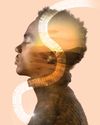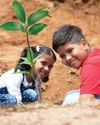
Here she is interviewed by KASHISH KALWANI, a former student of Professor Otis, about the ethics of care.
Q: Welcome, Professor Otis. Could you please share a little bit about your background and your interest in ethics and care?
At university, I studied biochemistry and neuroscience. Then I had a huge crisis, and ended up with a Ph.D. in comparative literature. So my research and teaching involve the intersection of literature and science. I became interested in caregiving because my mother developed early onset dementia in her early 60s, and that led to an interest in seeing how caregiving is represented in stories, novels, and plays, how people create narratives around caregiving, how realistic they are, and the ethics involved in representing caregiving. That's what brought me to the course at Emory.
Q: How do you find that literature and neuroscience have formed your understanding and approach to care and ethics, in academics and everyday life?
Literature and science evoke compassion in different ways. Science reminds us of what we all have in common. A lot of people in literary studies think that everything is influenced or even determined by culture and language, but when you think about how brains work, you realize that anyone's brain can develop problems.
As we age, we develop similar problems. Seeing the things that can go wrong with the human nervous system evokes tenderness in me. I realize how precious and beautiful it is, and want to take care of it, not abuse it. When I see someone who has trouble moving or thinking, I think that everything wrong with that person's nervous system could go wrong with mine, or with anybody I know. Science is a reminder of what we have in common.
Literature opens my mind to different ways of looking at caregiving and understanding or experiencing disease that might not otherwise have occurred to me.
Denne historien er fra February 2024-utgaven av Heartfulness eMagazine.
Start din 7-dagers gratis prøveperiode på Magzter GOLD for å få tilgang til tusenvis av utvalgte premiumhistorier og 9000+ magasiner og aviser.
Allerede abonnent ? Logg på
Denne historien er fra February 2024-utgaven av Heartfulness eMagazine.
Start din 7-dagers gratis prøveperiode på Magzter GOLD for å få tilgang til tusenvis av utvalgte premiumhistorier og 9000+ magasiner og aviser.
Allerede abonnent? Logg på

BEYOND the Beat
The Heart’s Intelligence in Compassion and Healing

The Devil's Tree
DR V. RAMAKANTHA, retired forest officer, who lived, raised a family, and worked in forests for most of his adult life, returns to our pages in 2025 to share his vast knowledge of medicinal plants, and the fascinating stories associated with them. In his signature style, this month he weaves together science, folklore, and traditional knowledge to tell the story of the Devil's Tree, Saptaparni.

The Joy of Unity
SARAVANAN SUBRAMANIAM, Director of HeartyCulture Natural Products, India, introduces us to a new type of grafted mango at the nursery in Kanha Shanti Vanam. Not only does this new variety bring diversity to our taste buds, but also symbolizes the unity in diversity we all wish for in ecosystems that include human beings.

The Beauty and Transformative Nature of Prayer
In the first episode for 2025 on spiritual practices, DAAJI offers us an inspiring and scientific explanation of prayer and its importance on the inner journey. He demystifies prayer by going beyond the religious connotations to its true purpose and the benefits it offers us as a means of evolution.

Parenting: A Purifying Experience
MEGHA BAJAJ is a new mother. She celebrates the life-changing joy of parenting, and the way the equilibrium of parental love keeps the world intact.

The Sacredness of Human Development
CHRISTIANNA DEICHMANN is the Director of Education at the Association for Prenatal and Perinatal Psychology and Health (APPPAH), where she educates both professionals and parents on fostering the most nurturing environments for welcoming new life into the world. She is based in Charlottesville, Virginia, USA. With a multidisciplinary approach, Christianna blends Craniosacral Therapy, massage, and pre- and perinatal psychology into her holistic practice. Her work uniquely combines science and spirituality.In part 2 of this interview, Christianna continues to shares her expertise with DR. SNEHAL DESHPANDE, a Developmental Therapist, PPNE, and the Director of Heartfulness Family Connect Programs, offering a rich dialogue on Birth Trauma and Obstetrical Intervention.

ONCE UPON A Saturday
SULOCHANA SANTHOSH is a young and inspired writer who reminds us of the need to care for our ocean and the environment in general. What are you doing to make a difference?

Seven of Us
is a lecturer at the Bangkok School of Management, a wellness coach, and the co-leader of the Bangkok Women's Writers Group. Here, Bhavna writes about her inspiring experience of cleaning up the garbage in the city that is her home.

UNLEASHING OUR Extraordinary Capabilities
LYNNE McTAGGART is one of the central authorities on the new science of consciousness, and the award-winning author of seven books, including the internationally bestselling The Intention Experiment, The Field, The Bond, and The Power of Eight. Here, Lynne is interviewed by PURNIMA RAMAKRISHNAN about the transformative power of intention, the profound impact of group intention, and the potential for individuals to create significant change in their lives and the world.

FROM Annoyance Serenity ΤΟ
SARALA UPADHYA shares her experience as a college professor to come up with a working model for how to manage annoyance both usefully and kindly. She has now reduced her “annoyance factor” making life more serene for herself and those around her.